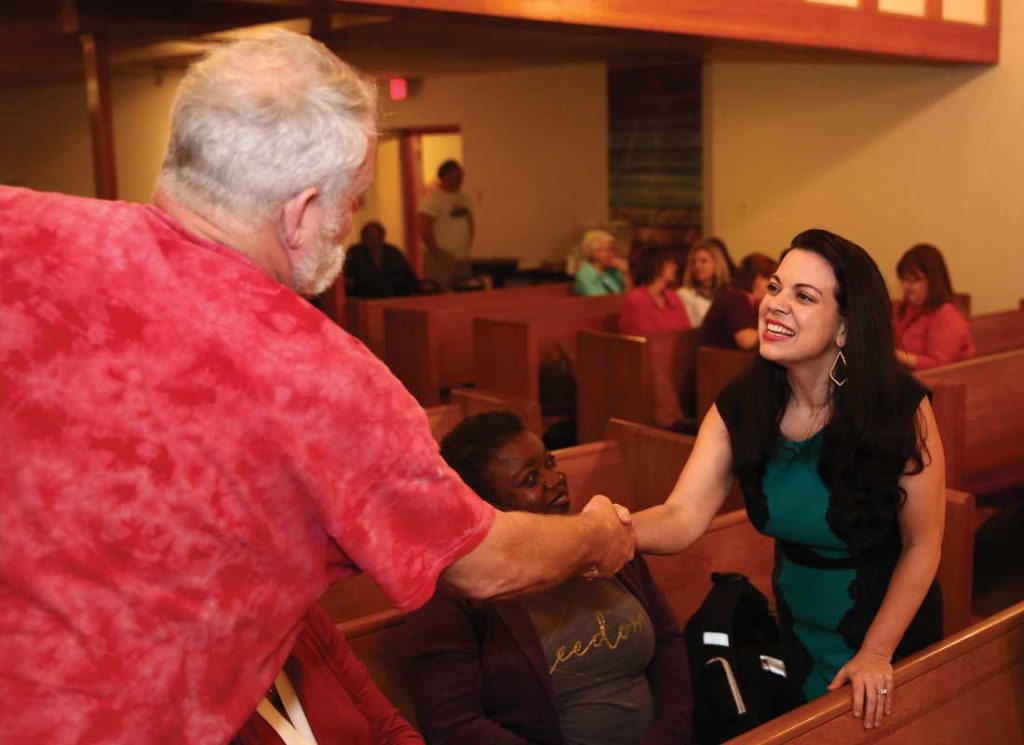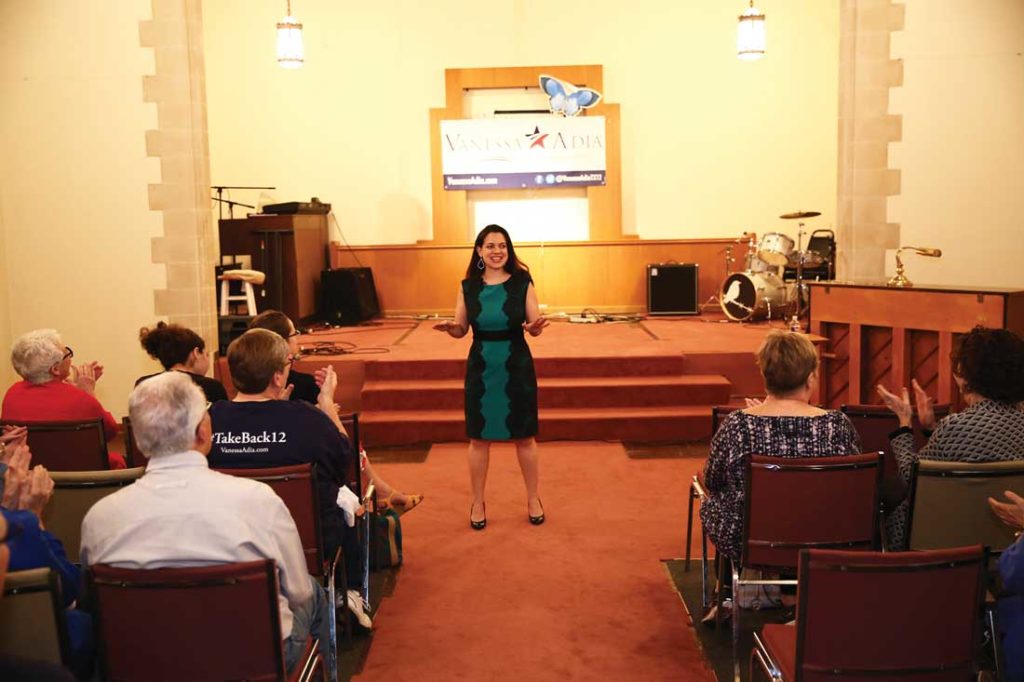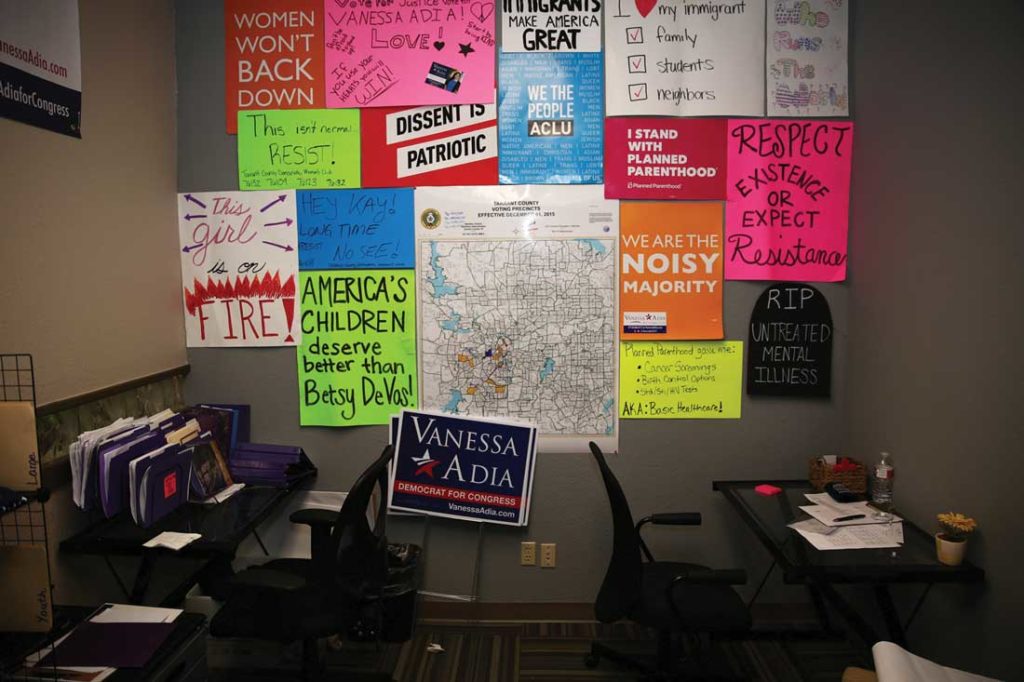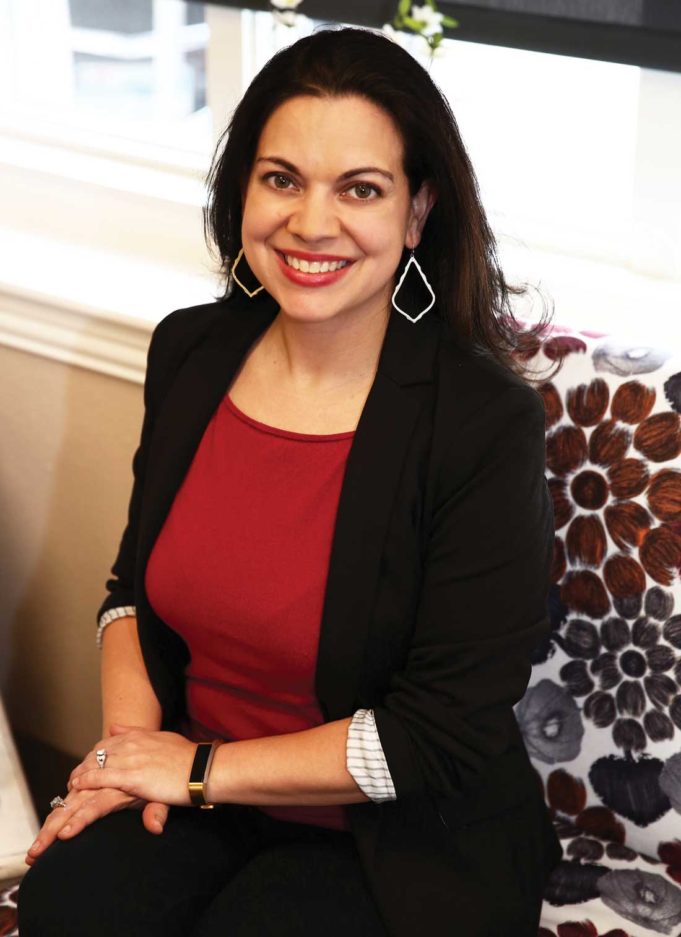Politics is a dirty business, so why would a happily married mother of two and an award-winning science teacher who describes her life as “pretty much ideal” decide to jump into the political ring and take on Kay Granger, the long-time Republican Congresswoman for District 12 — which includes Fort Worth — without proper funding or the backing of the national Democratic machine and with little hope of winning?
“Because someone has to fight for my daughters, my students, my neighbors,” Vanessa Adia said.
For too long, she continued, the power has not been in the hands of the people, a reality that she said hit her particularly hard after the 2016 election.
“After that election cycle, I saw my students becoming divided along racial lines,” Adia told me. “I saw an increase in bullying. Many of my students are undocumented or have family members who are undocumented, and I could see their hopes and dreams just die. They no longer see the American Dream as possible for them. They are told they are not wanted or valued.”
Prior to the 2016 election, Adia said she intended to take her two daughters — Sophia, 10, and Violet, 6 — to see the inauguration of the candidate who only ended up winning the popular vote (by a million ballots), Hillary Clinton.
“When she lost, we were obviously disappointed,” Adia said. “Actually, I was devastated, but then we heard about the Women’s March and decided to go there instead. We flew to [Washington, D.C.], and that was a life-changing moment. Leading up to the march, everyone was fearful and despairing, but the march itself was hopeful, and there was a very palpable feeling of hope in the people who were there, and that’s when I decided to run for office.”
It was something she had never done before, and she returned to her home in Benbrook to begin considering the reality of running for Congress.
“I had a lot of ‘What if’s. What if my daughters don’t understand the time I will have to spend away from them? What if the campaign drains our finances? What effect will this campaign have on my married life? But I realized, ultimately, that I was asking the wrong questions. The right question is: What if I don’t run? Who will fight for us?”
It is a fight she will have slim chance of winning. In all likelihood, Granger will not even acknowledge that she has an opponent. According to Bill Bradshaw, who ran against Granger in 2016, that’s how she treated him.
“I was ignored by her,” he told me. “I got no response to emails. She wouldn’t debate or even meet with me. It was a very normal response and one I would have suggested if I was her campaign advisor.”
Bradshaw, who describes himself as a “populist factory worker,” said that nothing stands out about Granger. Almost nothing. “She’s just a typical corrupt politician,” he said.
She is also almost impossible to beat in District 12, which includes the western half of Tarrant County, the eastern half of Parker County, including Weatherford, and north into Wise County, including Decatur.
“Anyone who understands our voter base here in District 12 knows that people identify as Republican or Democrat because their parents, friends, or family identify that way, and then some are single-issue voters,” he said.
And since the overwhelming majority identify and vote as Republicans, he said, the way to beat Granger would be to run against her as a Republican in a primary.
“I knocked on 11,000 doors in 2015 and 2016,” Bradshaw said, “and I learned that while people identify as Republican, when you talk with them about the issues, they are overwhelmingly progressive.”
Adia is full of progressive ideas on the issues, and she articulates them well. Stand them side by side with Granger’s, and they’re polar opposites. Where Granger, the first female mayor of Fort Worth, was once considered almost too liberal to run as a Republican for Congress, in about 2006 or so she took a hard turn to the right, embracing the radical right’s ideas — ones fueled largely by the American Legislative Exchange Council (ALEC) and Americans for Prosperity, both financially powered by the notorious Koch brothers — without hesitation. While ALEC devotes its time to writing legislation that benefits its corporate membership, and which members of Congress introduce as their own bills, Americans for Prosperity develops the agenda utilized by ALEC and dresses those corporate giveaways in language that makes them appeal to a wide swath of the American populace.
“What we see in politics now,” Adia said, “is that the lobbyists for the corporations have more say, outweighing the interests of the American people. I would like to be the kind of representative that I would like to have: one who listens to the people first.”
Sadly, while Granger once met with her constituents on a regular basis, she has not held a town hall in several years. “She’s simply not available to her constituents,” Adia said.
Her record reflects that. While she used to score around 30 percent with Planned Parenthood and NARAL Pro-Choice America, she has graded out at 0 over the past several years. She maintains an A rating from the National Rifle Association but scores another goose egg with both the NAACP’s Civil Rights Federal Report Card and the Humane Society, and the American Civil Liberties Union gave her a 5 percent rating in its 2017 period. Despite having been a teacher, Granger is rated 0 with the National Education Association.
Americans for Prosperity — which stands against the Affordable Care Act, unions, collective bargaining, and raising the minimum wage — gives Granger a lifetime mark of 88 percent. The list goes on. She stands against medical marijuana, is a staunch believer in marriage only between a man and a woman, rejects the availability of abortions, is anti-LGBTQ, and thinks we’ll have to come up with a way to privatize Social Security. She also wants stronger borders and better border control and has a 100 percent rating from the Federation of American Immigration Reform, an organization seeking to reduce both legal and illegal immigration.
Granger did not respond to my request for an interview.

Adia has very different ideas about all of the major issues. On women’s rights, she believes funding Planned Parenthood is essential “for women to be able to make the choices they need to make in their lives.” She said she is personally thankful for Planned Parenthood. In her early 20s, she said, “I didn’t have insurance, and I wanted to be able to get birth control, and I was able to get it through Planned Parenthood. Because of that, my husband and I were able to choose when to start our family, which was eight years after we got together and were financially sound.”
She also stands for equal pay for women, family leave for both parents when a child is born, and paid sick leave.
Adia thinks Obamacare was “a great start, because it covered pre-existing conditions [and] mental healthcare [and] allowed parents to cover their children until they are 26 and provided a host of other good things, but I think we can still do better. I support Medicare for all. To be truthful, I am tired of contributing to friends’ GoFundMe pages to help them with medical issues. Too many people still need to choose between their bills or their health on a regular basis.”
Though gun control is a deal-breaker in Texas, Adia does not shy away from the issue: “Mass shootings with mass casualties happen in churches, restaurants, theaters, and schools. If we truly care about our students’ and neighbors’ safety, we have a responsibility to do more than just what makes our elected officials feel better. I support common sense gun reform that still respects the Second Amendment, such as universal background checks on every sale, banning bump stocks and similar accessories, and providing the funding to the Centers for Disease Control [and Prevention] to once again address gun violence so that we can create evidence-based policy to address the issue.”
Adia thinks we need to make a priority of writing a clean Dream Act: “We need that now so that people brought to this country as youngsters are not living in fear, and then we need to tackle the overall issue of immigration reform. Politicians have talked about it for decades, but they’ve done nothing about it that honors hard-working immigrants who contribute so much to our economy and culture.”
How would she go about immigration reform?
“There are plenty of plans that have been proposed over the years,” she said. “We could start with almost any of those just to get it out on the floor so that we could begin talking about it.”
She is for equal rights for all, including the LGBTQ community, and believes climate changes is real, wants reasonable restrictions on businesses to protect our environment, college available to all, to fully fund the Veteran’s Administration, and wants to protect good police officers and fire the ones who abuse their power.
It’s a smorgasbord of decency and a platform that Democrats should be able to back wholeheartedly — if Adia could only get the word out. Congressional races in the recent past have run about $2 million apiece, and the science teacher has little chance of raising that.
“I’ve gotten donations from over 3,000 people so far,” she said, “and that number is growing. These are everyday people, teachers, nurses, just regular people. If I’m offered [political action committee] money, I won’t take it, because I think that places corporations over people, and that’s the wrong way to govern.”
Her calls to the Democratic Congressional Campaign Committee, the organization that funds Congressional races, were disappointing, she said. While the DCCC is funding several Democrats in long-held Congressional seats that look winnable, they are not backing Adia. Calls to the national office were met with indifference, she said. When it was suggested that even a paltry $50,000 could give Adia quite a bit of exposure on social media — and could certainly put her in a position to win an election in 2020 if she loses this year — James Stretch, the committee’s Southern political director, ho-hummed it. “I’m sure we will look into it again, but that is not a race we are concentrating our funding on at the moment,” he told me.
The Texas Democratic Party is firmly behind Adia, but they have no money to fund anything. Cliff Walker, the group’s political director, said the organization is “privileged and honored to have a candidate of Vanessa Adia’s caliber running in District 12. She is running a robust campaign in a difficult district, and we think she might even upset the incumbent. Unfortunately, we don’t typically make direct contributions to candidates. Our priority is to coordinate efforts across the state on the progressive issues, so we facilitate coordination by providing tools and training to people who will support our candidates.”
Adia’s background is educated middle class. She was born in 1979 in Houston. Her father was a physicist and her mother a mathematician. Her parents divorced when she was 2, and she lived with her grandparents in Arkansas for a time before her father was given custody: “Mom remarried quickly. Dad remarried when I was 5. He was a Southern Baptist, so I had a good, solid middle-class upbringing.”
She grew up with four half-brothers — her mother had one, her dad three — and was the oldest, “so I was like a parent in some ways to them.”
She went to a public elementary school just north of Houston before attending a magnet high school, the Academy of Science and Technology. “I dropped out of that because I’d gotten involved in church — we were no longer Baptists but were involved with the Disciples of Christ — and I’d decided I wanted to go into ministry.”
A big part of that decision, Adia said, was seeing how people helped one another during the Houston flood of 1994: “That got me thinking of how to use my experience to help others and started my transition into how I could have a positive impact on the lives of other people.”
Deciding to join the ministry brought her to Fort Worth in 1998, where she was a religion and philosophy double major at TCU — and where she met her future husband, Dean Adia. While at TCU, she also served as a youth director at Westwind, a Bible of Christ church in Keller: “I was there when the World Trade Center tragedy occurred and led my youth through that horror and tried to get them to understand it. I didn’t tell them what to think. I just wanted them to think about it and see how they might be able to apply what they came up with to other areas of their lives.”

It was during that same time that Adia, then Caulkin, began to question whether she really wanted to go into pulpit work and decided that was not her calling. She switched over to UTA for her master’s in social work, focusing on community organizing and nonprofit administration. By the time she finished with that degree, she was working for the foundation of an investment firm: “I worked there for five years and got to meet incredible people doing incredible community things, and I met a lot of politicians who inspired me to work in a different way with the community. For example, as soon as my husband and I finished building our house in Benbrook, I applied to work on their parks and recreation board. I wound up becoming vice-chair of that board and was there when we went through the process of building a new park in Benbrook, maybe the first they had in 20 years. My daughters call it ‘Mommy Park’ because my name is on a plaque in the pavilion there.”
She later served on the planning and zoning commission for Benbrook, then in 2008 she got swept up in the Obama campaign: “I was inspired by him. I became a mega-volunteer, canvassing, registering voters, phone banked, trained new volunteers. Sophia was just a baby at the time and I strapped her into a baby carrier, and I took her everywhere with me. The thing is that when I was doing that, I felt alive in a way I had not previously. I had a great job, making good money, but I started reevaluating what it was I really wanted to do and decided that instead of meeting amazing people doing wonderful things, I wanted to be one of the people doing wonderful things, which led me to want to do more than be the CEO of a nonprofit somewhere, and that’s when I decided to become a teacher.”
The decision was “scary,” Adia said, not only because it paid half of what she was earning but because of the commitment: “I think that if you measure success on the positive impact you have on others, well, being a teacher has more impact than almost any other job. A good public education will help people become themselves, so I gave it a shot and wound up loving it and being very good at it.”
Currently in her ninth year at the Benbrook Middle-High School, Adia has been the science department chair. She has written curriculum and trained new teachers, and for the 2014-15 school year she was awarded the Fort Worth school district Teaching Chair of Excellence for Secondary Science, an award she’s very proud of.
“But then the last election cycle happened, and I felt compelled to run for office,” she said. “At the end of the day, I want to tell my daughters and students that I did something, that I saw where our country was going and what was happening to my neighbors, and I said, ‘No, I cannot live with that.’ I want to work to get back to a place where we recognize our common values and common humanity.”
What qualifies you to be a member of Congress?
“What qualifies me to be a good member of Congress is that I am a person of integrity, passion, and determination, and the first and last question I will always ask with regards to policy or this campaign is ‘Does this help the people of this district?’ ”
If you were elected, would you have the strength to stand up to the bullying you will no doubt face as a newbie?
Adia laughed.
“I teach middle school,” she replied, “which means that I have a lot of patience and am willing to do the hard work that’s necessary to get through to people even when they are fighting you every step of the way. Why? Because at the end of the day, they matter.”
I asked Adia for a couple of examples, beyond policy, in which she differs from Granger.
“The interesting thing about Kay Granger,” Adia began, “is that she does not offer much, but she gets enormous amounts of money from corporate PACs and the corporate elite while refusing to hold town halls. That makes it very difficult for constituents to even get a meeting with her. I am already doing the work that I think a Congressperson should do in their community. I meet people in their living rooms, in churches, I’m holding town halls and making myself as available as I can to the people of this district.
“I also differ from Kay Granger in other ways. For instance, she initially came out to ask for Trump to resign after Pussygate, but since that time she has been a rubber stamp for him. She’s gone so far as to parrot his both sides after Charlottesville. We need people of courage, not people who are just worried about their career, and that lack of courage is a byproduct of not offering much. A member of Congress has a responsibility to represent the people of their district. That means being willing to listen to their concerns, their struggles, and their hopes and dreams for the future. That also means focusing on policy that reflects what you hear. In the community, the people are worried about education, healthcare, the economy, and immigration. That’s what we need to focus on in a positive way.”
Karen McInnes, who has worked with Adia for five years as a teacher at the Benbrook school, believes she is the right kind of politician.
“The first thing you need to know about Vanessa Adia is that she is a great person,” McInnes said. “She always stands up for the students, making sure they have the supplies they need so that they can succeed. She always puts others first. For me personally, I was a long-term substitute, and she helped me understand what to do as a full-time teacher, which happened suddenly. I think she’ll bring new ideas and information to Congress. She will reach out to the community and work with them. She will give 110 percent to make certain that what needs to be done will get done.”
Sam DeValdenebro said that Adia was the science chair when he first started teaching in public schools after years of working in private schools.
“She was a guiding light,” he said. “She holds herself to a very high standard and is driven by excellence. She listens, she responds, and she does not get rattled in a debate. She has all the tools that someone on the political path should have, and I mean the good tools. She can get in front of a crowd and talk, respond, think on her feet. She will be a great statesman.”
Lon Burnam, former state representative for Fort Worth, chimed in as well: “She is simply very bright, very honest, very articulate, and I would love to see her in elected office. She’s a difference maker. She’s a great candidate.”
Adia held her first town hall at the First Congregational Church in South Fort Worth earlier this month. During the sign-in and volunteer sign-up beforehand, I approached several people to ask why they were there. The interviews were informal, with just me collecting first names from the dozen or so people with whom I spoke.
From the stage of the small, simple chapel came the strains of Bob Dylan’s “The Times They Are a-Changin’ ” and John Lennon’s “Power to the People.” Adia, at 38, is too young to know those songs in their day, so I guessed that she must have an old hippie among her volunteers. The small, growing crowd was typical of Democrats and liberals: some faded tie-dye shirts, mismatched shirts and pants, rumpled hair, unkempt beards, a little bit loopy looking, a little bit drowsy, but with fierce eyes that did not intend to miss a thing.
I asked a fellow named Pat why he was there. “We need young blood to bring change to Tarrant County,” he said, “and Vanessa is that. Plus, as a teacher, she’s on the frontline of education, and that is an important topic for me.”
A guy named Steve said he believed Adia was thoughtful: “She has spent a lot of time learning about the issues. I know her and simply trust her judgment.”
A friend with Steve named Bob jumped in: “Why Vanessa rather than the tried and true Kay Granger? I don’t really know. If we could find Kay, maybe we could ask her.”
Cathy, there with her husband Carey, said they had met Adia on a train to an immigration march: “We got to know her. She believes in healthcare for all, in good schooling, and she won’t take PAC money. She stands for all the things that are common-sense right. She’s simply a good person, and that is what our Congress needs.”

Carey said Adia “aligns with the issues I back: common-sense gun law, healthcare for all. She believes in science. For us to abandon science now, whether on environmental issues or other issues, is crazy. Those are my three big issues, and Kay Granger does not line up with them. Kay is out of touch. She has an A rating from the NRA. She takes loads of PAC money and won’t take calls from constituents. It’s just time for a change.”
A muscle-bound guy named Bob said he wasn’t for or against Adia: “I’ve only been here for four years, and I’m open-minded. I just came to hear what Ms. Adia has to say. I’m interested because I think Kay Granger has become a little too complacent.”
Dennis said he was there because of Adia: “I’m for Vanessa. I’d like to see her do well. It’s a big hill, everybody knows that, and I’m still learning about her, but I personally think that Kay has been around too long. When I moved here 20 years ago, Kay was helpful and available. Now she appears to have sold her soul.”
Someone who overheard Dennis noted, “Granger is not just a fixture here in Fort Worth. She’s been around so long, she’s become a statue.”
Adia entered the chapel through a rear side door a few minutes before the town hall was to start. She was bright and energetic, and she stopped to say hello to more than a dozen people before heading up to the front of the hall, where she was introduced by her campaign manager (and former Fort Worth Weekly graphic designer) Veronica Penrod.
By the time Adia took the stage, the crowd had grown to about 70 people. She introduced herself with confidence and talked a few minutes, then she opened the floor to questions. For nearly two hours, she listened and responded. She was good on her feet with the partisan crowd but looks like she’d be good with a hostile crowd as well.
Adia knows her chances of unseating Granger are slim. She’s running as a Democrat for a seat held by a Republican for 30 years. Voters are creatures of habit, and it would take something extraordinary for enough people to pull the other lever, but she’s still in it for the long haul.
And if she doesn’t win?
“Then I’ll run again in two years,” she said.













Nice campaign piece. I hope she reports it as an in kind donation.
Well, it would have been less one-sided if Kay Granger had found the time to get in touch.
Hillary Clinton won the popular vote by almost THREE million.
Kd: Yes, of course. Brain-freeze is my only excuse. I apologize.
I am sure that Adia is a nice person and sincere. I just don’t see the news in a candidate who has zero chance of winning unless Kay Granger gets caught with a dead prostitute. Her last statement that she will run again no matter what the outcome is disappointing. Give it your best shot, if you lose-move on. (See Bo French). Don’t keep going to the well. Most candidates do worse the second time around barring a scandal or major national political shift.
Does this newspaper receive money, directly or indirectly, from George Soros?